- Home
- Ian McDonald
Sacrifice of Fools
Sacrifice of Fools Read online
PRAISE FOR THE WORK OF IAN McDONALD
“[McDonald is] a master for a new generation of sf.” —Analog
King of Morning, Queen of Day
Winner of the Philip K. Dick Award
“Filled with wondrous language, marvelous events.” —Science Fiction Chronicle
“A brilliant book.” —Charles de Lint
Scissors Cut Paper Wrap Stone
“Cyberpunk’s first lyrical poem, mixing Kabbalah, manga, pop-culture trivia and Zen with enough style and dexterity to actually pull it off . . . [McDonald] does more in a page than most writers do in a chapter.” —Neal Stephenson
The Broken Land
“At once disturbing and beautiful; superbly realized.” —The Times (London)
“Ian McDonald takes on all the atrocity and strife of the 20th Century, radically displaces it, and dares to envision a means of change. It’s a brilliant achievement.” —Locus
“McDonald is a superior writer.” —Booklist
Sacrifice of Fools
“A spell-binding tale of intrigue and empathy.” —SF Site
“A powerful and effective story.” —Jo Walton
Sacrifice of Fools
Ian McDonald
Bye baby Bunting,
Daddy’s gone a-hunting…
(trad.)
Contents
March, three years earlier
Monday afternoon–Tuesday night
Wednesday morning–Friday
Saturday morning–Sunday morning
Sunday
Monday-Tuesday morning
Tuesday afternoon-Tuesday night
Wednesday
April
A Biography of Ian McDonald
March, three years earlier
HE KNOWS IT’LL BE bad because they’ve stolen him a Ford. Nothing good, not ever, about Fords. Cold, hard to start, drive too fast: just like his life. Skidoo’s first steal: a ’96 Mondeo. Anyone can take a Ford, a five-year-old with half a metre of parcel strapping could, but Skidoo’s proud of his achievement. Fleet car: the clothes hook above the driver’s side rear window is worn shiny. The night before the job he changes the plates and acids out the licence numbers etched into the quarter-light glass. He checks the engine. Slowly, thoroughly. He always checks the motor before a job. If anything goes wrong, it won’t be Andy Gillespie’s wheels. But it’s a Ford, and that’s not good. The bars on the cargo lantern turn the tin garage into a prison of shadows. He mutters mechanic’s charms and prayers as he moves around the naked engine.
There are three doing the job: Big Maun, Soupy and Skidoo. They are waiting around the delivery entrance of the Linfield Supporters’ Club with their sports bags. Glasgow Rangers. Liverpool. Man U. Skidoo has the sawn-off tucked in safe between rolled sports socks. His job is to keep the place quiet while Big Maun and Skidoo do the work. Gillespie picks them off the street on a wet March lunchtime. Skidoo rides up front. He’ll be first in. It’s not a long drive, a mile or so from the Castlereagh Road to the Avenue One Bar, but slow. The traffic is heavy.
‘Lunchtime rush,’ Gillespie says.
‘In this town? Where the hell to?’ Big Maun says. He is a big man, and he acts hard, but Gillespie knows he’s as scared as any of them. Gillespie despises him and all of his kind. All those hard men, all those Big Men. Easy to be big and hard with a gun in your Rangers bag. Gillespie knows Big Maun does not trust him because he suspects Gillespie’s loyalties are not true and pure. Gillespie’s happy about that.
Skidoo is an easy fool. He’ll do anything to please anyone. You talk harder than the hard men, but when the RUC get you in that room up in Strandtown you will tell them everything from the size of your shoe to the length of your cock because it will please them very much. You have it in your face, like a birth mark, and everyone can see it but you. Easy-osy fool. At school, in your family, with your mates, they all knew you’d give them exactly what they wanted: sweets, toy cars, cigarettes, drink, girlfriends, money. Now, a Manchester United bag with a short-barrelled pumper nestled among the jocks and socks.
Teenage mothers push baby buggies over the pedestrian crossing. They form a wide front clearing all before them. Like the war chariot of Cuchulain, Gillespie thinks. They’re yakking, and looking to see who’s looking at them. Gillespie’s looking in his mirror. Job member three. Soup. The inevitable consequence of being born a Campbell. Oh, that rich, rare Ulster humour. Ha fucking ha. But you’re the only one who would understand my thought about the war chariots and the ancient warriors of Ulster. The Big One, the fool follower, the pale, quiet, smart one. The usual clichés. With their driver.
The kid Skidoo has his palms pressed to the side window and is licking the glass, showing off to the teenage mothers. They nudge one another and laugh and give him two fingers. Their thin tops, soaked by March rain, cling to their breasts. Skidoo’s laughing like a mad man.
‘Will you for fuck’s sake sit at fucking peace?’ Soup says. His voice is thin and penetrating like a blade. Skidoo turns and raises a solitary fuck-you finger to him. Soup grabs it, bends it backwards. Skidoo yelps and fumbles for his sports bag and the piece inside.
‘Fuck up, the pair of youse,’ Big Maun says. The crossing lights turn flashing amber. Gillespie accelerates smoothly away. Soup releases the finger. Skidoo redirects his testosterone to the radio.
‘Woo. Digital FM.’ The system scans through fragments from a dozen transmitters.
‘Leave it alone,’ Gillespie says.
‘I only want some fucking music, man.’
The radio drops on to a station.
Dr Coupar: your immediate reaction to the joint statement by the President of the United States and the European leaders. Awe? Fear? Satisfaction?
Well, John, I think mostly it’s the sheer relief of incontrovertible proof that we aren’t alone in the universe. Certainly, this is the most momentous event in human history.
Yes, but there are eight million of them, and they’re as close as Jupiter…
Skidoo hits the scan button. The radio hunts for music. It settles on a local FM station of the kind that have it written into their contracts that they must play a Tina Turner song every hour.
‘I like the mystery record,’ Skidoo says.
‘I was listening to that,’ Gillespie says.
Skidoo is a gum chewer. He loops the wad around his molars and turns his grin on the back seat. The moment of heat with Soup is forgotten.
‘Hey, any of you boys get it last night? Like, you know, night before, special, like? Make it extra good?’
‘Jesus, you didn’t fucking open your mouth to some bitch?’ Soup says. ‘Christ, do we have to have this amateur?’
‘I didn’t say nothing,’ Skidoo whines. ‘What you think I am? But I picked up this girl at the club, and it was like, because I knew I was going to do it today, I could do anything, and she like knew it too. Wanted it as much as I did. Bet none of youse ever made a bitch cry like, a cat. Like a big fucking alley cat, on my bed.’
Soup rolls his eyes in disgust.
‘You should keep yourself in,’ Big Maun says. ‘Keep pure before a job. Like them athletes; they keep away from women before a race. Sucks out your power.’
‘Just trying to make conversation, like.’
‘Dirty wee shite,’ Soup mutters.
The song ends and the DJ announces in his strange Ulster-American twang that they’ll be rolling the mystery record over to tomorrow because IRN is doing an extended bulletin at the top of the hour about this thing they’ve found out at Jupiter.
‘Fuck,’ Skidoo says and draws his leg up and stamps at the radio with the heel of his boot.
‘Hey hey hey,’ Gillespie says, checking in his rear-view that the bi
g Montgomery Transport artic really is flashing him into the right-turn lane.
‘Sure we’re going to torch the fucking thing anyway, afterwards,’ Skidoo says petulantly.
‘Let him drive,’ Big Maun says.
He drives. The rain turns the Victorian red brick of the upper Templemore Avenue the colour of blood. That’d be about right. Dark day: the lights behind the ugly plastic shop signs on the Albertbridge Road are switched on. Across this junction, and it’s there at the bottom of Templemore Avenue. He surveyed the run a week ago. Lines, exits, traffic density. The bar is on the corner, the entrance is on Templemore Avenue, but there are lights on to the Newtownards Road. He won’t be waiting on the main road either: no, he’ll go for the delivery alley down the side that opens on to the entry behind the houses on Tower Street. Across Tower Street another entry leads to Madrid Street. They’ll go this way. No one would imagine a Loyalist hit squad escaping into republican Short Strand. Gillespie drives past the bar, turns left at the lights and pulls into a recently vacated bus stop.
‘Right, lads.’ Sound of sports bags unzipping. Gillespie sees the shake of Skidoo’s hand. He can smell fear on his breath. It smells like sick. Gillespie knows then for certain that it’s going to be bad. Skidoo sees that Gillespie sees this fear.
‘All right, let’s do it!’ he says, rattling off the safeties on the pumper to show how brave and full of spunk he is.
‘Just a wee moment.’ Big Maun closes his eyes and clasps his hands. ‘Lord,’ he whispers, ‘we know that you hate all evil-doers and punish the sinner in your sight. We know that drugs, well, they’re just about the most evil ever came out of the pit of Satan and we thank you that you appointed us to be your righteousness. Be with us when we’re in that bar, Lord. Stand beside us. Remind us that it’s your work we’re doing. Don’t let us mess it up. Amen.’ He pauses for the response. Nothing. ‘Right. You know the drill. Keep your bags high, throw them away once you get your piece out. Skidoo, make sure you’re out of the way when Soup and me open up. Gillespie’ll wait five minutes at the pick up. Miss him and you make your own way on foot. Any questions?’
Shakes of the head.
‘Right, lads.’
Gillespie waits until they are around the corner on to Templemore Avenue. Three more blatant hoods it would be hard to imagine. Instead of the names of football teams on their bags, they should read ‘Loyalist Hit Squad’.
He parks in Tower Street facing the entry to Madrid Street. Students from the further education college come and go. The girls look denimy. Gillespie rear-views them for something to do. The clock says top of the hour. They should be doing it. He doesn’t much want to think about it, so he fiddles with the radio. It works despite Skidoo’s boot.
… envoys appointed by the United Nations to conduct negotiations with the extra-terrestrial fleet in parking orbit in the shadow of Jupiter’s moon Europa. Negotiations are expected to concentrate on granting settling rights in exchange for technology.
Jesus God. They aren’t making this up. April Fool’s three weeks off. They exist. They’re here and we’re asking Jesus to bless us blow away some kid peddling smack in our parish.
The movement in the rear-view grabs his attention. Running figures. Already? Too early. It’s too soon. Something wrong. He starts the car. As he leans across to open the doors, he notices in the wing-mirror there are only two men running down the alley, dodging the grey plastic wheelie bins. Gillespie reverses into the entry. Over his shoulder he sees new figures appear in the rectangle of light at the far end of the alley. Shouts. The rearmost of the two running men turns, lifts his weapon.
Shots.
The figure falls. The other men come running down the alley, guns held high trying to get a shot, but Soup is in the rear seat and Gillespie is burning across Tower Street. Denimy girls scatter. File binders flap and flop like poisoned crows.
‘Set-up, it was a fucking set-up,’ Soup yells. Gillespie guns down the entry, pushing a wedge of trapped wheelie bins in front of him. If anyone steps out of a back gate now, it’s sure death. ‘They were waiting inside. Skidoo’s down, Big Maun got us out.’
‘He’s down too,’ Gillespie says, wing-mirrors scraping old Belfast brick. Tiny scrolls of plastic swarf flutter from the mirror housings. That close. ‘I saw him go down.’
‘Jesus Christ, what a fucking mess.’
The woo-woos have started: to the right, to the left, behind. Hunting. Closing down the bolt-holes. Rabbits in a warren. The Ford plunges out of the brick mouth of the alley on to Madrid Street. Gillespie throws a handbrake left. He misses a BT van by millimetres. The vanguard of bins slews across the road. Baby-buggy pushers, old women out on sticks, wee lads with no jobs: every head turns. The woo-woos are closing fast, but not fast enough. Hadn’t reckoned on us running right across your own fat laps. The Ford touches sixty-five past the Munster-mansion pile of Mountpottinger police station, bristling with radio masts behind its wire-mesh blast shields. Fort Apache in the alien nation of Short Strand. Long Troubles, slow peace.
Gillespie sees the lights go orange thirty yards from the junction and floors the pedal. The cross traffic starts to move, then stops in a flurry of screeches and horns as the Ford comes through. Something to point out on the teatime news when they get home and say, ‘I was there’. Except today I think the schedules will be taken up with something else. The left-turn light is still red but Gillespie goes on to the footway to undertake the stationary traffic and turns on to Woodstock Link in front of a City bus.
‘What the fuck are you doing?’ Soup shouts.
‘They knew we were doing the job, they’ll know where we’re going. I’m going to dump this thing up off My Lady’s Road, burn it, walk away. Catch a bus. They won’t look for us on buses.’
Gillespie pulls a ninety degree right across the face of an oncoming Peugeot hatchback down a sudden entry. The Peugeot stops in a smoke of tyres. He knows the secret of getting any other car to stop for you: it’s communicating that you are not, ever, going to stop for it. You’re not going to think of even slowing down. It’s not bin day in Woodstock ward. Gillespie takes a child’s bicycle left lying in the entry and smashes it flat. That’ll learn you for leaving your toys lying around. The end of the entry leaps towards him. Beyond, the waste ground littered with the charred debris of Twelfth bonfires, where the trouble boys go to smash things. Bonfire coming early this year.
And the red wedge nose of a Ford MPV blocks the square of light. A line of mutual recognition and realization connects Gillespie with the little girl in the back seat. You could be my daughter, my Stacey. Do I look like your dad, is that the expression on your face, or is it that you recognize the inevitability of impact? It is slow, it is perfectly timed. He can shove in the clutch and stand on the brakes, but it won’t matter because it’s all predestined. He may as well take his hands off the wheel, his feet off the pedals and surrender to it. He does. The glide in to impact is slow and smooth and serene. Front left to back right. Metal, glass, plastic, rubber, detonate. The stolen Ford tail-spins. The MPV slides end first away from the explosion in a shatter of glass. All the back windows have gone. Through the spray of sugar-cube glass comes sailing the little girl.
Gillespie does not see where or how she falls to earth.
The stolen Mondeo has been spun around to face down the entry from which it came. There is nothing left of the front. The windscreen is out. Soup is lying in his seat belt, blinking and gasping. Gillespie steps out of the wreck into the glass-strewn street. The MPV stands in the middle of the road. Its rear end is gone. The woman driver is wailing. People are coming from the houses to help, but the distances seem too great and their movements too slow ever to get here.
How strange your days have turned out, Gillespie finds he’s thinking. In your early spring afternoon — weather acceptable — two cars smash without permission or explanation or warning. Wailing woman at the wheel: you pick your daughter up, taking her shopping, maybe to the doctor’s, may
be to a relative’s; you couldn’t foresee that it’ll end in smash and the breaking of your life and your daughter in intensive care. Me: Andy Gillespie. You start the day planning the murder of a drugs dealer; you will end it in a police cell. Nation: world: you begin with breakfast shows and cereals and rush to work, you end with new neighbours, other lives from somewhere else, without permission or explanation or warning.
The sirens are closer now, only streets away.
Monday afternoon-Tuesday night
THE SUIT IS THREE years out of fashion, but he wears it. He does have another one but it’s only a year out of date: too soon for the great wheel of style to have come round to it again. He re-knots the tie — the first was too small, like a blood-clot on his throat — but he still looks like a spiv. Outside in Eglantine Avenue the taxi hoots. It’s only a few metres’ dash from the door, but enough to soak his number two suit through. Wet March. Wet February before it; wet January, wet December, wet November. Wet April to follow; probably wet May. Used to be weather in this country. Now all we have is climate. Plenty of theories, from global warming to atmospheric damage stirred up by Outsider gravity fields. Can’t hoist theories over your head, like an umbrella.
‘Where to?’
‘Magistrates’ court.’
Court is one destination on which taxi drivers won’t quiz you. He makes one comment, on Great Victoria Street, passing a humped-back microbus with a cab company number on the door and roof sign.
‘That’s what I’m getting, when I get money. Run for ever on tap water. Amazing.’
‘They call it something like zero-point energy, but don’t ask me how it works. Shouldn’t work at all, scientists say.’
The taxi bus draws alongside. Steam wisps from its tail piece.
‘Oil companies are going to hate it. Surprised they didn’t try to buy it up and bury it, like the everlasting light bulb.’

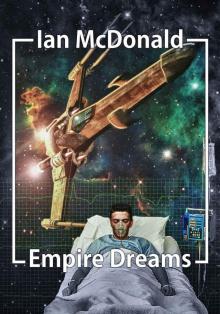 Empire Dreams
Empire Dreams The Menace from Farside
The Menace from Farside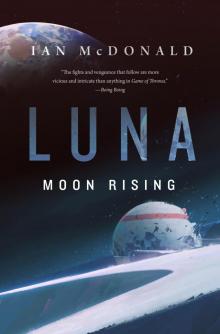 Luna: Moon Rising
Luna: Moon Rising Moon Rising
Moon Rising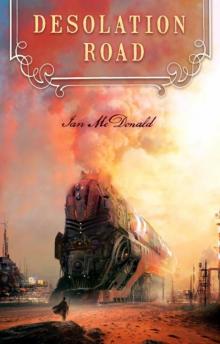 Desolation Road dru-1
Desolation Road dru-1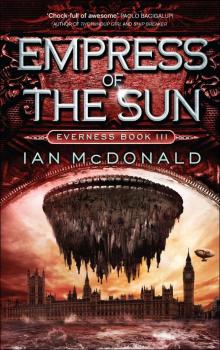 Empress of the Sun
Empress of the Sun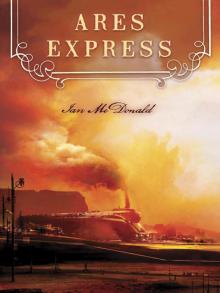 Ares Express dru-2
Ares Express dru-2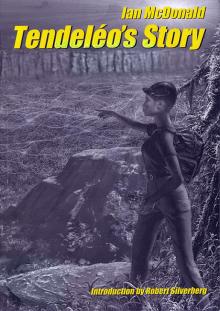 Tendeléo’s Story
Tendeléo’s Story River Of Gods
River Of Gods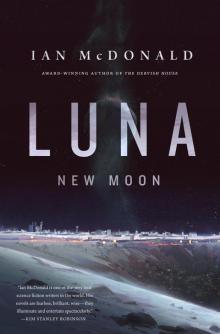 Luna
Luna![Cyberabad Days - [River of Gods 02] Read online](http://i1.bookreadfree.com/i1/03/29/cyberabad_days_-_river_of_gods_02_preview.jpg) Cyberabad Days - [River of Gods 02]
Cyberabad Days - [River of Gods 02]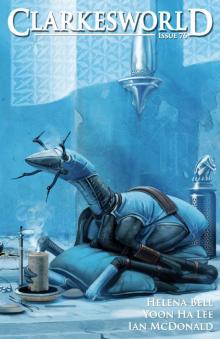 Clarkesworld Magazine Issue 76
Clarkesworld Magazine Issue 76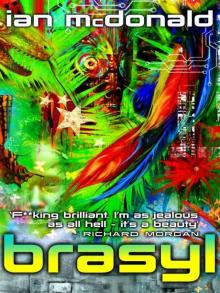 Brasyl (GollanczF.)
Brasyl (GollanczF.)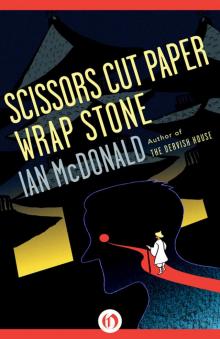 Scissors Cut Paper Wrap Stone
Scissors Cut Paper Wrap Stone Chaga
Chaga Time Was
Time Was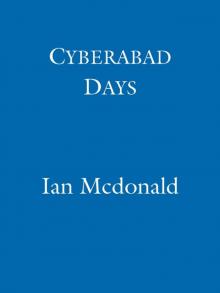 Cyberabad Days
Cyberabad Days Be My Enemy
Be My Enemy Changa
Changa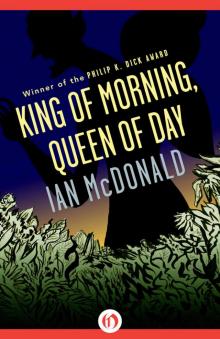 King of Morning, Queen of Day
King of Morning, Queen of Day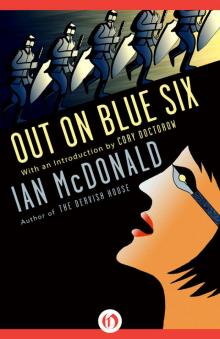 Out on Blue Six
Out on Blue Six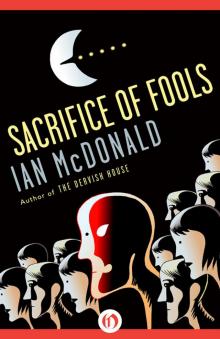 Sacrifice of Fools
Sacrifice of Fools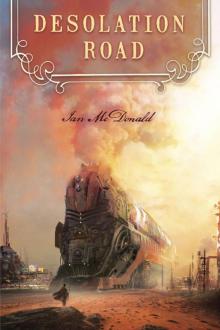 Desolation Road
Desolation Road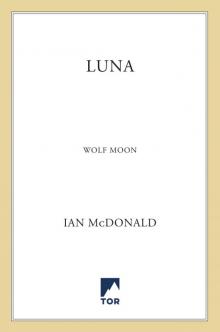 Luna--Wolf Moon--A Novel
Luna--Wolf Moon--A Novel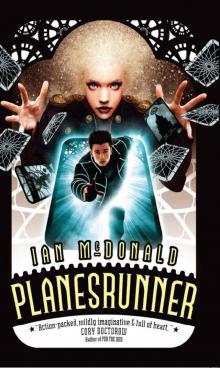 Planesrunner (Everness Book One)
Planesrunner (Everness Book One)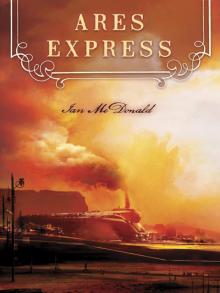 Ares Express
Ares Express